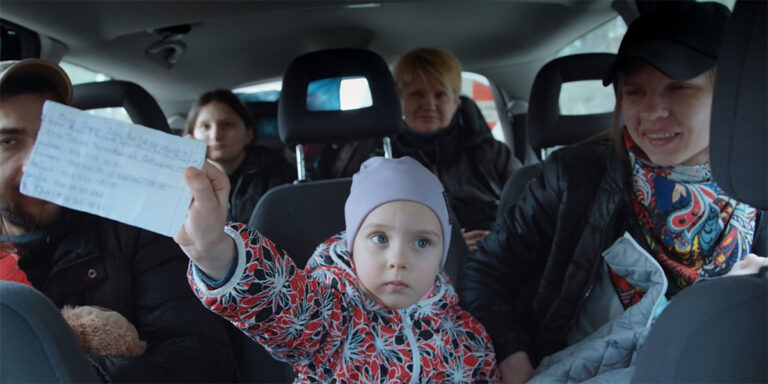
One of the great functions of increasingly effective technology is its ability to capture and document what is happening in the world. It becomes more difficult to dismiss an account of an event when there is video evidence, and even if there are those who argue that it can be staged or manipulated, seeing things play out and watching the eyes of those within the frame affords an unparalleled look at a moment in time. In the Rearview does just that, chronicling the journey of a people from one existence to the next through the lens of a camera that remains mostly fixed in place.
Polish filmmaker Maciek Hamela owns and operates a van with the primary aim of getting Ukrainian refugees to Poland. The van makes frequent stops and answers house calls, cycling passengers in and out along the way. Some sit in silence and look either forward or down, while others speak about what it is that they’ve been through, and, particularly, what they’ve lost. They find common ground with other passengers, if only because they are all headed in the same direction, far away from the place that they previously called home.
Hamela makes his feature directorial debut with the understated In the Rearview, which is the latest in a series of films about the current state of Ukraine but which comes at it from a markedly different angle. The world is only as big as the confines of the van’s walls and doors, with information trickling in from phone calls, checkpoint updates, and occasional sights from the distance. This isn’t a large-scale look at a country in decay, but instead an intimate trip with people doing what they have to in order to confront the reality that has found them.
Capturing the stillness in a landscape of uncertainty and devastation is an impressive feat, and it’s something that this film leans into. It’s emblematic of Hamela’s approach to the work that he does with his van, which often finds him driving long distances in the hopes of reaching someone who has requested a pickup, because he knows that if he does not come, it’s unlikely anyone else will. He also faces danger every time he crosses through a checkpoint, unsure of whether he’ll be stopped or detained, but he persists, and his camera remains there to take it all in.
This is a documentary that doesn’t feel staged or particularly structured, and in fact there are moments in which people speak almost not to the camera at all, unaware or unconcerned that their words are being recorded. They are having everyday conversations about the state of their lives, and the camera is there simply to document and not to pass judgment. While his subjects would likely have been willing to speak and tell their stories in a more direct interview, Hamela chooses to sit back and merely take in what is happening, untainted by his filmmaking influence.
The hands-off nature of In the Rearview allows real people going through unimaginable circumstances to take the spotlight, portraying a genuine and human piece of an international conflict that many can’t hope to understand. While this film couldn’t possibly grasp the entirety of its causes and effects, that’s not what it’s trying to do. It’s an effective snapshot of the moments in which these people enter and exit the van, sharing a piece of themselves as they pass in front and then out of the lens of the camera.
Grade: B+
Check out more of Abe Friedtanzer’s articles.
In the Rearview makes its North American premiere in the TIFF Docs section at the 2023 Toronto International Film Festival.

